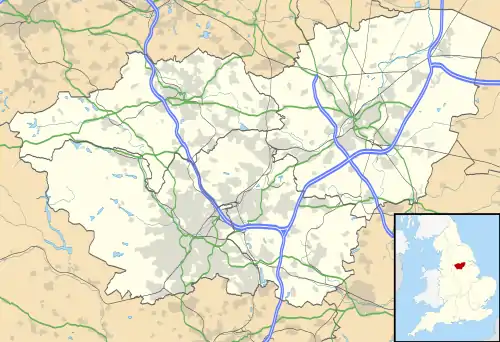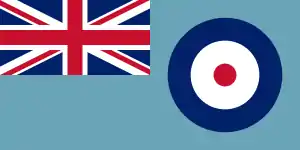RAF Bawtry
Royal Air Force Bawtry or more simply RAF Bawtry is a former Royal Air Force station located at Bawtry Hall in Bawtry, South Yorkshire, England and was No. 1 Group RAF Bomber Command headquarters and administration unit during and following the Second World War.
| RAF Bawtry | |
|---|---|
| Bawtry, South Yorkshire in England | |
.jpg.webp) East side of Bawtry Hall | |
 RAF Bawtry Shown within South Yorkshire | |
| Coordinates | 53.4286°N 1.0226°W |
| Site information | |
| Owner | Ministry of Defence (United Kingdom) |
| Operator | Royal Air Force |
| Controlled by | RAF Bomber Command RAF Strike Command |
| Site history | |
| Built | 1785 |
| In use | 1941–1986 |
| Garrison information | |
| Past commanders | David Parry-Evans (AOC 1 Gp 1982)[1] |
The site is currently being used as a Luxury Wedding Venue, working with the Crown Hotel in Bawtry
History
Bawtry Hall itself is a large redbrick house in two storeys with attics which was erected around 1785 by Pemberton Milnes, a prosperous wool-merchant from Wakefield, Yorkshire. It descended in the Milnes family for several generations before being sold to Major George Peake, a well-known amateur pilot, in 1905. It is a Grade II* listed building.[2]
During the Second World War the RAF took it over and it became an RAF command centre. RAF Bawtry did not have its own airfield but instead took advantage of RAF Bircotes, which was located nearby. Here the station based a number of communications aircraft.[3]
Bawtry Hall served the Royal Air Force from 1941–1984; first as HQ for No. 1 Group, Bomber Command during and after the Second World War, then as HQ No. 1 Group as part of Strike Command up to and including the later stages of the Cold War. The famous bombing of the airfield at Port Stanley by Vulcan bombers from RAF Waddington during the Falklands War was co-ordinated from the operations room at Bawtry Hall.[4]
RAF Bawtry became the centre of the RAF Meteorological Service for many years[5] and ceased military operations in 1986.[6] In June 1987 Bawtry Hall was purchased by The Welbeck Estate Group.
No. 1 Group Bomber Command units based at RAF Bawtry comprised as follows: –
| Airfield . | Squadron | Aircraft Type | Number of Aircraft . |
| RAF Elsham Wolds | 103 Sqn | Avro Lancaster I and III | 17 |
| RAF Elsham Wolds | 576 Sqn | Lancaster I and III | 8 |
| RAF Kirmington | 166 Sqn | Lancaster I and III | 23 |
| RAF Ingham | 300 (Polish) Sqn | Vickers Wellington X | 23 |
| RAF Ingham | 300 (Polish) Sqn | Lancaster I and III | 0 – Re-equipping |
| RAF Wickenby | 12 Sqn | Lancaster I and III | 16 |
| RAF Wickenby | 626 Sqn | Lancaster I and III | 14 |
| RAF Grimsby | 100 Sqn | Lancaster I and III | 18 |
| RAF Grimsby | 550 Sqn | Lancaster I and III | 7 |
| RAF Ludford Magna | 101 Sqn | Lancaster I and III | 22 |
| RAF Binbrook | 460 Sqn RAAF | Lancaster I and III | 27 |
| RAF Kelstern | 625 Sqn RAAF | Lancaster I and III | 17 |
+data from:[7]
During the Miners' Strike in the mid-1980s, police officers were based at RAF Bawtry to provide a central Operations and co-ordination point on the South Yorkshire / Nottinghamshire border.[8]
Present
The Air Training Corps 2008 Squadron is still located at the former site on Park Road in Bawtry, in a new building that replaced the former ones.[9]
It was sold by Defence Estates in the mid 1980s to a Roger Byron-Collins company who owned Bawtry Hall for 3 years together with the nearby technical and domestic site at RAF Hemswell and the post war married quarters sites at RAF Finningley and RAF Scampton. Later the building was bought by Action Partners Corporation, a Christian organisation, and has been used as teaching and conference centre for the past 24 years.[4]
The trustees had taken the decision to close the hall on 31 December 2013 and a buyer was being actively sought.[10] The hall was sold in 2014 for £1.6 million to Bawtry Hall properties who would be moving various video gaming enterprises into the building.[5]
See also
References
Citations
- Douglas-Home, Charles, ed. (13 December 1982). "Appointments in the Forces". The Times. No. 61413. p. 14. ISSN 0140-0460.
- Historic England. "BAWTRY HALL (1151550)". National Heritage List for England. Retrieved 9 January 2016.
- Halpenny 1981, p. 47.
- "Bawtry Hall played an important role in history". Retford Guardian. 15 October 2007. Retrieved 31 May 2016.
- Bateman, Stephanie (27 March 2014). "Bawtry treasure sold for £1.6 million". Doncaster Free Press. Retrieved 31 May 2016.
- "Magnificent Bawtry Hall '" its history and timeline". Doncaster Free Press. 2 September 2018. Retrieved 15 March 2022.
- "Bases of Bomber Command Then and Now". After the Battle. Archived from the original on 17 September 2010. Retrieved 6 January 2008.
- Dowden, Richard; Bevins, Anthony (5 July 1984). "Havers joins police cash fight". The Times. No. 61875. p. 1. ISSN 0140-0460.
- "Bircotes and Bawtry". Abandoned, forgotten and little known airfields in Europe. Retrieved 31 May 2016.
- "Bawtry Hall Closure Plans". Action Partners Corporation. Archived from the original on 29 June 2013. Retrieved 28 June 2013.
Bibliography
- Freeman, Roger Anthony. Bases of Bomber Command : then and now. London, UK: Battle of Britain International, 2001. ISBN 1-870067-35-5.
- Halpenny, Bruce. Action Stations 2; Military airfields of Lincolnshire and East Midlands. Cambridge, Cambridgeshire, UK: Patrick Stephen Publishing, 1981. ISBN 0-85059-484-7.
- Halpenny, Bruce. Action Stations 4; Military airfields of Yorkshire. Cambridge, Cambridgeshire, UK: Patrick Stephen Publishing, 1982. ISBN 0-85059-532-0.
